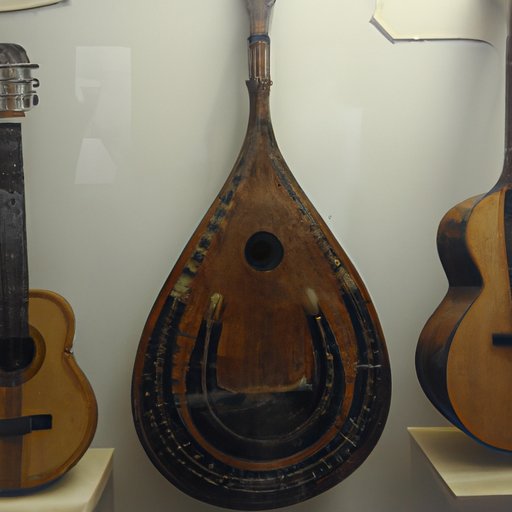Introduction
The guitar is one of the most iconic instruments in the world. Its distinctive sound and versatility have made it a staple in almost every genre of music, from jazz to rock & roll to country. But when were guitars invented? This article will explore the history of the guitar, from its ancient origins to its modern-day variations, and uncover the mystery of when the guitar was first invented.

Historical Timeline of the Invention of the Guitar
The history of the guitar dates back to ancient times. According to archaeological evidence, the oldest known stringed instrument is the tanbur, which originated in Mesopotamia around 3000 B.C.E. The tanbur had a long neck and three pairs of strings, and was believed to be the precursor to the lute. The lute, which first appeared in the Middle East in the 8th century, was a popular instrument during the Middle Ages and Renaissance periods. It had a pear-shaped body, four strings, and a curved neck.
By the 15th century, the guitar had begun to take shape. The earliest version of the guitar was the vihuela, a five-string instrument that was popular in Spain and Italy. The vihuela was a smaller version of the lute, but with a flat back and a longer neck. Over the next few centuries, the guitar underwent several changes, including the addition of frets, which allowed for more precise tuning. By the 19th century, the guitar had evolved into the six-string instrument we know today.
Inventors Behind the Guitar: Who Brought Music to Life?
Throughout history, there have been many innovators who helped shape the guitar into the beloved instrument it is today. One of the most influential figures in the development of the guitar was Antonio de Torres. De Torres was a Spanish luthier who lived in the 19th century and is considered the father of the modern classical guitar. He developed a new design for the instrument that increased its volume and resonance. His innovations were widely adopted by other luthiers, and his style is still used today.
Another important figure in the history of the guitar was Orville Gibson. Gibson founded the Gibson Guitar Company in 1902, and revolutionized the industry with his innovative designs. He introduced the archtop guitar, which had a curved top and gave the instrument a brighter sound. His guitars were embraced by jazz musicians, and they remain popular to this day.

Exploring the Evolution of the Guitar Through the Ages
The guitar has changed significantly over time, with different types of guitars being developed for different styles of music. The acoustic guitar is the most common type of guitar and is used for a variety of styles, such as folk, blues, and country. The electric guitar is popular in rock & roll and other genres that require a louder sound. Finally, the bass guitar provides the low-end notes in many musical styles.
Uncovering the Mystery of When the Guitar Was First Invented
Despite its long history, the exact date of the guitar’s invention is still shrouded in mystery. Many theories have been proposed about when the guitar was first invented, but there is no definitive answer. Some believe the guitar was invented in the Middle Ages, while others argue that it wasn’t until the 19th century that the modern guitar emerged.
One theory suggests that the guitar was invented by the Ancient Greeks in the 5th century B.C.E. However, this theory is disputed by many historians, as there is no archaeological evidence to support it. Other theories suggest that the guitar was invented in Spain or Italy in the 16th century.
The debate surrounding the exact date of the guitar’s inception is likely to continue for some time. What is certain, however, is that the instrument has been around for centuries, and has undergone numerous changes and innovations over the years.
An Overview of Different Types of Guitars and Their Origins
Acoustic guitars are the most popular type of guitar and are used in a wide range of styles. Acoustic guitars are usually made of wood, and produce a mellow sound. They can be strummed or plucked, and come in a variety of sizes and shapes. Electric guitars are typically made of solid body materials such as aluminum, steel, or plastic. They produce a bright, amplified sound and are used in many genres, such as rock & roll, metal, and jazz. Bass guitars have four strings and provide the low-end notes in many musical styles. They are usually made of wood and have a longer neck than other guitars.

How the Guitar Has Influenced Music Genres Throughout History
The guitar has had a profound impact on music throughout history. Jazz musicians embraced the instrument, using it to create complex rhythms and melodies. Rock & roll was born out of the electric guitar, and its signature sound has become synonymous with the genre. Country music also relies heavily on the guitar, and its twangy sound is an essential part of the genre. Finally, the blues would not be the same without the guitar, and its unique sound has become a hallmark of the genre.
Conclusion
The guitar has a long and storied history, and its influence on music genres around the world is undeniable. While the exact date of its invention is still debated, one thing is certain: the guitar has been around for centuries, and its popularity continues to grow. From its ancient origins to its modern-day variations, the guitar remains one of the most beloved instruments in the world.
(Note: Is this article not meeting your expectations? Do you have knowledge or insights to share? Unlock new opportunities and expand your reach by joining our authors team. Click Registration to join us and share your expertise with our readers.)
